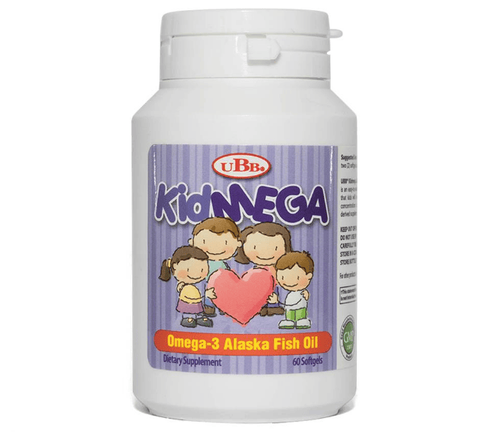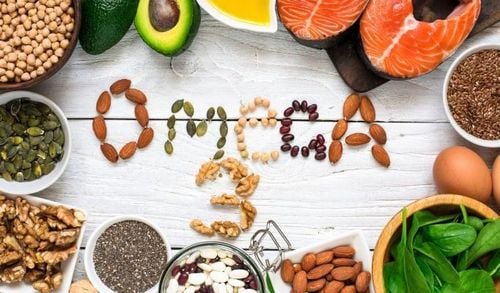This is an automatically translated article.
In adults, DHA has a protective role against many chronic diseases such as cardiovascular disease, depression, diabetes, and neurodegeneration (Alzheimer). For infants and young children, DHA is essential to ensure visual development, promote better intellectual and psychological skills.1. How important is DHA?
DHA is an abbreviation for Acide docosahexaenoïque - an omega-3 polyunsaturated fatty acid, accounting for a very high percentage in the brain's gray matter (affecting intelligence) and in the retina - nearly 60% in the retina. commander-in-chief of eye sight).
In adults, DHA has a protective role against many chronic diseases such as cardiovascular disease, depression, diabetes, neurodegeneration (Alzheimer). For infants and young children, DHA is essential to ensure visual development, promote better intellectual and psychological skills.
DHA is in the group of essential omega-3 fatty acids, along with EPA(1) and ALA (2). Lack of omega 3 will lead to the risk of diseases, significantly affecting the functioning of the human body.
2. Consequences of DHA deficiency
For pregnant women:
DHA deficiency in pregnant women can increase the risk of preterm birth, pre-eclampsia as well as postpartum depression, menopausal problems, osteoporosis and other cardiovascular diseases. With the effect of stimulating the pregnant woman's body to produce more red blood cells, in order to meet the nutritional and oxygen requirements for the development of the fetus, both physically and mentally, DHA is an indispensable nutritional component. deficiency in women during pregnancy and lactation. Therefore, experts recommend that mothers should supplement with foods rich in DHA right from the first days of pregnancy, throughout pregnancy and lactation so that the child can have the best intellectual development. health, immunity. Because the formation of the fetal nervous system begins very early and the brain development of the baby in the womb takes place extremely vigorously.
In fetuses and infants:
DHA deficiency will directly affect the development of the child's immune system.

Tầm quan trọng DHA ở trẻ sơ sinh
Increases the risk of children having asthma and allergies later on, and at the same time limits the level of intelligence, poor learning ability, delayed development compared to children of the same age who are fully supplemented with DHA. Therefore, babies need to be absorbed DHA through the placenta while in the womb and breast milk when born to ensure the baby has enough DHA needed for the best development.
3. DHA in what foods?
What food is DHA in is a question that many mothers are wanting to supplement DHA for their children with food in their daily meals. According to the World Health Organization, foods with a lot of DHA include:
Fish: Salmon, carp, mackerel, tuna, sardines, herring, shark... are fish that contain high levels of DHA. DHA is very good for the intelligent development of the baby, but pregnant mothers should only eat sea fish in moderate amounts (300grams/week), to avoid the risk of mercury poisoning. Shrimp, crab, squid: These are seafood rich in DHA and calcium fats. And this is also a commonly used food in daily meals because of its diverse and simple processing such as: steaming, boiling, cooking soup, roasting, braised... Egg yolk: This is a DHA-rich food for the baby and choline is very good for the brain development of the fetus. However, you should only eat eggs that are completely cooked, not soft-boiled eggs, beaten eggs. Nuts: Like almonds, walnuts, peanuts, etc., are rich in DHA which is good for the brain and vision of young children. Pregnant women can make milk from these nuts or use as a daily snack. Green vegetables: Cauliflower, pumpkin, cabbage, kale, watercress are foods rich in DHA for babies and fiber to help pregnant women improve their daily meals. Should buy clean vegetables and process them properly to ensure health. Condensed milk for pregnant women is supplemented with good levels of DHA for the development of the fetus. DHA supplements: On the market, there are many multivitamins or separate DHA supplements for pregnant women with appropriate DHA content. However, pregnant mothers need to consult a nutritionist for specific advice on their needs, along with the level of DHA deficiency in their daily meals.
4. How to supplement with DHA for good health?
With pregnant women: During pregnancy, pregnant women need to supplement DHA to ensure the brain development of the fetus. Diet before and during pregnancy is very important for the status of essential fatty acids (EFAs: Essential Fatty Acid) for the fetus. Especially in the last 3 months, an average of 1 day fetus needs 2.2g EFAs/day for the development of the nervous system and blood vessels. Babies whose mothers provide enough DHA during pregnancy, especially in the second half of pregnancy. Periods tend to score higher on hand-eye coordination tests, and their IQs are also higher.
Premature babies and newborns

Cần bổ sung DHA cho trẻ đẻ non và sơ sinh
Requires an adequate supply of DHA because the infant is not able to convert the DHA precursor from vegetable oils, or other breast milk substitutes to DHA. Breast milk provides enough EFAs for babies, so exclusive breastfeeding and breastfeeding for up to 24 months is important.
After 40-45 days of birth, DHA in breast milk accounts for 0.3% AA: 0.4% and DPA: 0.2%. In special cases where the child is not breastfed, it is necessary to choose breast milk substitutes supplemented with the above fatty acids.
Period from 1 to 6 years old This is also the period when DHA is needed because they help stimulate the child's brain development. From 6 years old and above is the time when children start learning, so the brain needs enough DHA to absorb new knowledge.
Besides DHA, parents should supplement their children with supporting products containing lysine, essential micro-minerals and vitamins such as zinc, chromium, selenium, B vitamins to help fully meet the nutritional needs of children. young. At the same time, these essential vitamins also support digestion, enhance nutrient absorption, help improve anorexia, and help children eat well.
Parents can learn more:
Signs of zinc deficiency in children
Micronutrient deficiency and failure to gain weight in children
Please regularly visit Vinmec.com website and update useful information to take care of your child. Take care of the baby and the whole family.
Article compiled from the source: National Institute of Nutrition.













